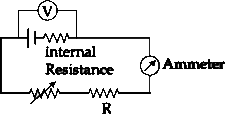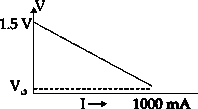Is Ohm's law a fundamental law?
Step-by-Step Solution:
1. Understanding Ohm's Law: Ohm's Law states that the current (I) flowing through a conductor between two points is directly proportional to the voltage (V) across the two points, provided the temperature and material properties remain constant. This can be mathematically expressed as:
V=I⋅R
where R is the resistance.
2. Distinguishing Fundamental Laws: A fundamental law in physics is a basic principle that describes a natural phenomenon and is universally applicable under all conditions. Examples include Coulomb's Law and Gauss's Law, which describe the behavior of electric forces and fields.
3. Evaluating Ohm's Law: Ohm's Law is not considered a fundamental law of nature. It is an empirical law, meaning it is based on experimental observations rather than derived from more fundamental principles.
4. Limitations of Ohm's Law: Ohm's Law holds true under certain conditions, such as:
- The material must be ohmic, meaning it has a constant resistance.
- The temperature must remain constant.
However, when large currents pass through a conductor, the temperature can increase, leading to a change in resistance. This means that the relationship between voltage and current is no longer linear.
5. Conclusion: Therefore, while Ohm's Law is a useful and widely applicable principle in electrical engineering and physics, it is not a fundamental law of nature. It serves as an approximation that works well under specific conditions but fails under others, particularly when dealing with high currents or non-ohmic materials.
---
V=I⋅R
where R is the resistance.
- The material must be ohmic, meaning it has a constant resistance.
- The temperature must remain constant.
However, when large currents pass through a conductor, the temperature can increase, leading to a change in resistance. This means that the relationship between voltage and current is no longer linear.
Topper's Solved these Questions
- CURRENT ELECTRICITYBOOK - AAKASH SERIESCHAPTER - CURRENT ELECTRICITYEXERCISE - EXERCISE (VERY ANSWER QUESTIONS) (Choose the correct alternative)
3 Videos
- CURRENT ELECTRICITYBOOK - AAKASH SERIESCHAPTER - CURRENT ELECTRICITYEXERCISE - PROBLEMS (LEVEL-1)
17 Videos
- CURRENT ELECTRICITYBOOK - AAKASH SERIESCHAPTER - CURRENT ELECTRICITYEXERCISE - EXERCISE (SHORT ANSWER QUESTIONS)
12 Videos
- COMMUNICATION SYSTEMS BOOK - AAKASH SERIESCHAPTER - COMMUNICATION SYSTEMS EXERCISE - PRACTICE EXERCISE (TV Antenna)
16 Videos
- CURRENT ELECTRICITYBOOK - AAKASH SERIESCHAPTER - CURRENT ELECTRICITYEXERCISE - EXERCISE - IA
2 Videos
Similar Questions
Knowledge Check
Assertion: Ohm's law is not valid if current depends on voltage non-linearly.
Reason: Ohm's law is a fundamental law of nature.AIf both assertion and reason are true and reason is the correct explantion of assertion.BIf both assertion and reason are true and reason is not the correct explantion of assertion.CIf assertion is false but reason is true.DIf assertion is true but reason is false.
Maxwell's equations describe the fundamental laws of
View SolutionMaxwell's euqations describe the fundamental laws opf
View SolutionState Ohm's law and draw a neat labelled circuit diagram containing a battery, a key, a voltmeter, an ammeter, a rheostat and an unknown resistance to verify it.
View SolutionLet I= current through a conductor, R= its resistance and V= potential difference across its ends. According to Ohm's law, product of two of these quantities equals the third. Obtain Ohm's law from dimensional analysis. Dimensonal formulae for R andV are ML2I−2T−3andML2T−3I−1 respectively.
View SolutionAre conservation of mass and conservation of mechanical energy fundamental laws of nature?
View SolutionA : Ohm's law is universally applicable for all conducting elements.
R : All conducting show straight line graphic variation on (l-V) plot.
View SolutionTo verify Ohm's law, a student connects the voltmeter across the battery as shown in the figure. The measure voltage is plotted as a function of the current, and the following graph is obtained


if VO is almost zero. identify the correct statement
View Solution
